In What Ways And To What Extent Did The Fourteenth And Fifteenth Amendments Change The Relationship
Northern Blacks and the Reconstruction Amendments
The 13th, 14th, and 15th Amendments to the Constitution, sometimes known as the Reconstruction Amendments, were critical to providing African Americans with the rights and protections of citizenship. The 13th Amendment formally abolished slavery. The 14th Amendment established African Americans as equal citizens of the United States. This amendment overturned the 1857 Dred Scott v. Sanford instance in which Supreme Courtroom Chief Justice Roger B. Taney had written that black Americans were non citizens and thus had "no rights which the white human being was bound to respect." Finally, the 15th Amendment gave African American men the right to vote. Northern African Americans were tireless advocates for these amendments, fighting for equality on behalf of their recently freed brethren as well as for themselves.
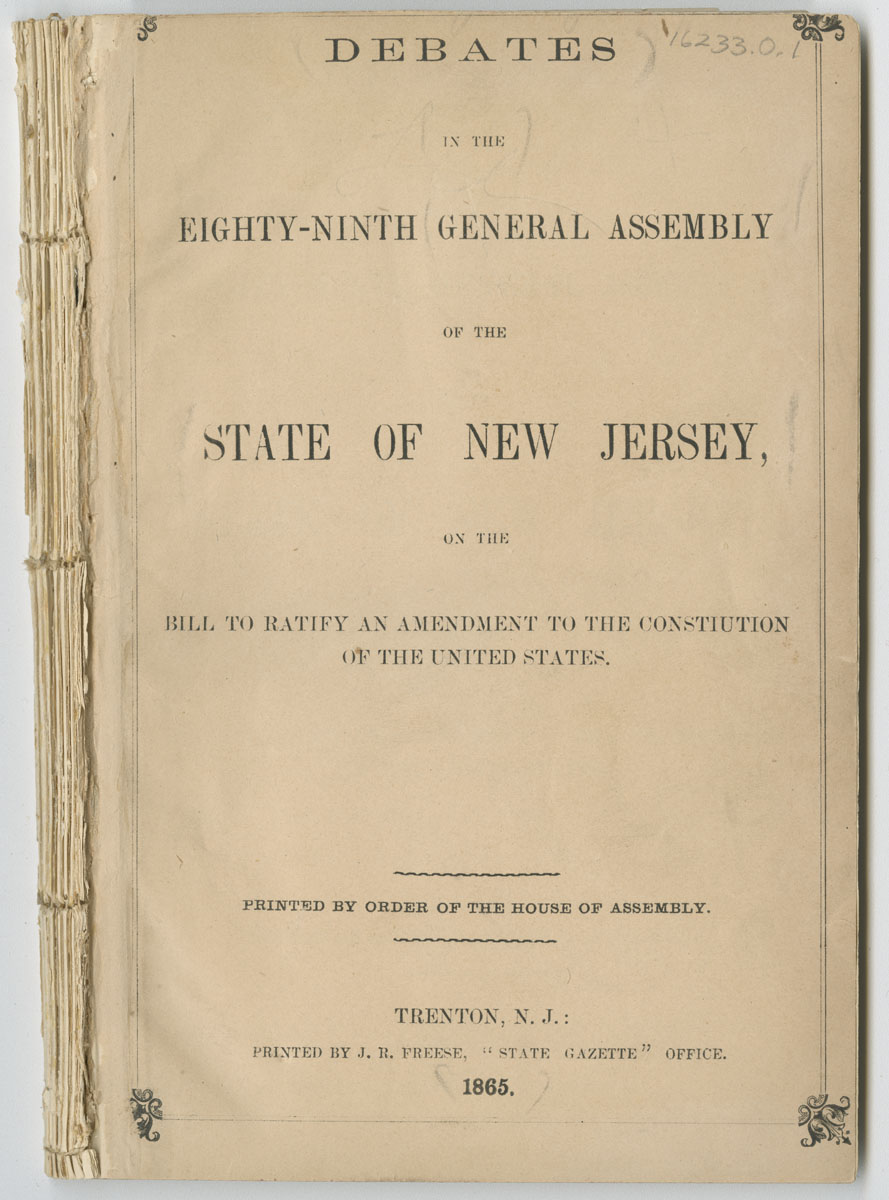
Debates in the Eighty-Ninth General Assembly of the State of New Jersey on the Nib to Ratify an Amendment to the Constitution of the United States . Trenton: J.R. Freese, 1865.
Even with the effect of the Civil War apparent to all, the New Jersey legislature initially refused to ratify the Thirteenth Amendment in March 1865. Although some legislators were concerned nearly the constitutionality of the process, others feared that passage would increase the immigration of blacks to the land. Past December vi, 1865, the required number of states, including eight states of the onetime Confederacy, had approved the subpoena, making the amendment an official office of the U. S. Constitution without New Jersey support.
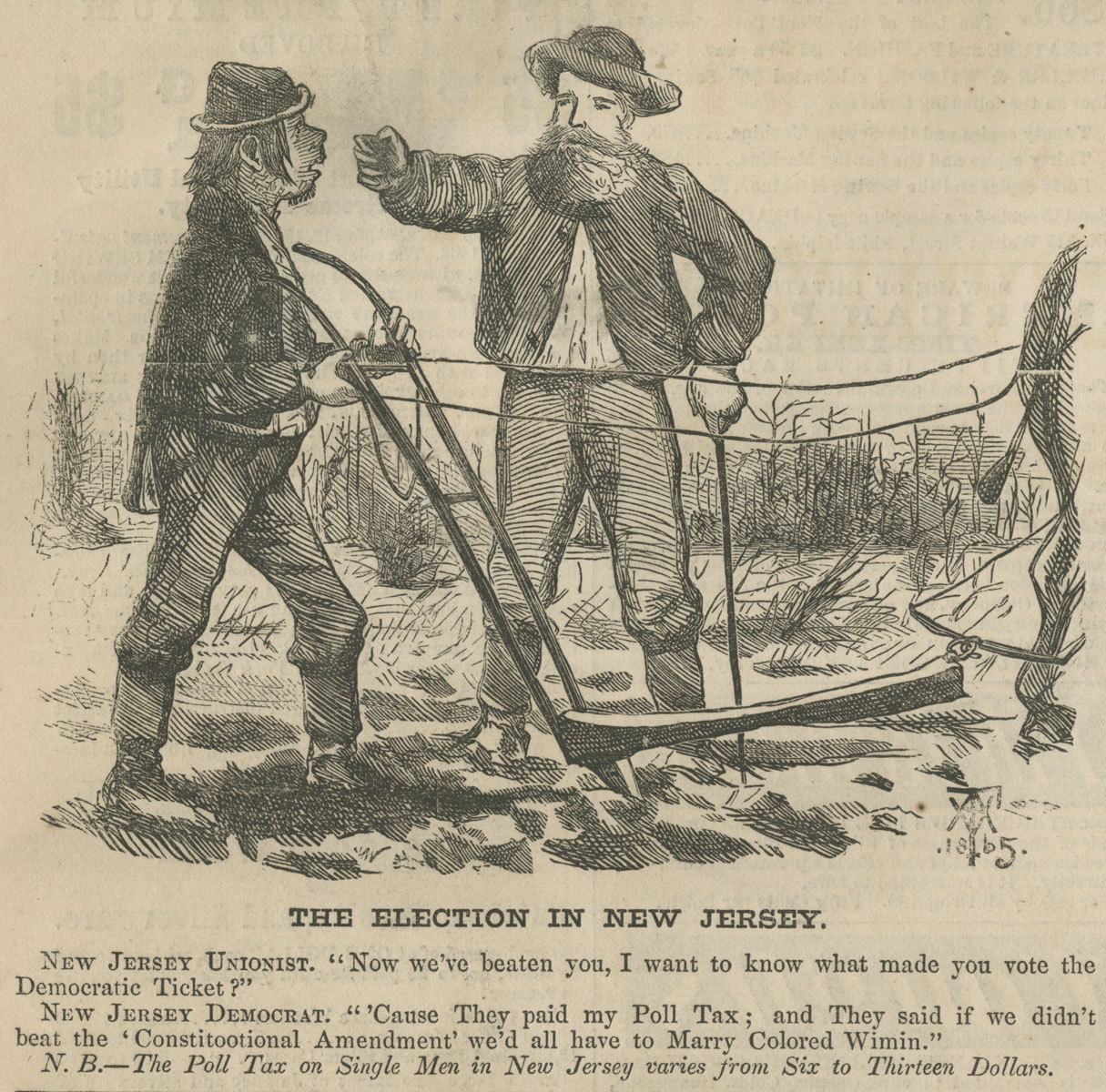
"The Election in New Jersey." Harper's Weekly (November 25, 1865).
While Pennsylvania was amidst the first states to ratify the Thirteenth Amendment in February 1865, Democrats in the neighboring country of New Jersey opposed ratification. As this cartoon shows, the amendment'southward opponents in the New Jersey Full general Assembly incited fright that passage would pb to increased black migration northward and racial miscegenation. The Democratic Party also attempted to win support past paying the steep poll tax for white voters who would not exist swayed solely by racial motives. Even so, the state's November 1865 ballot resulted in a new land legislature equanimous largely of Republicans and other Unionists. As a result, New Jersey ultimately ratified the subpoena in January 1866, when the new legislature took function.
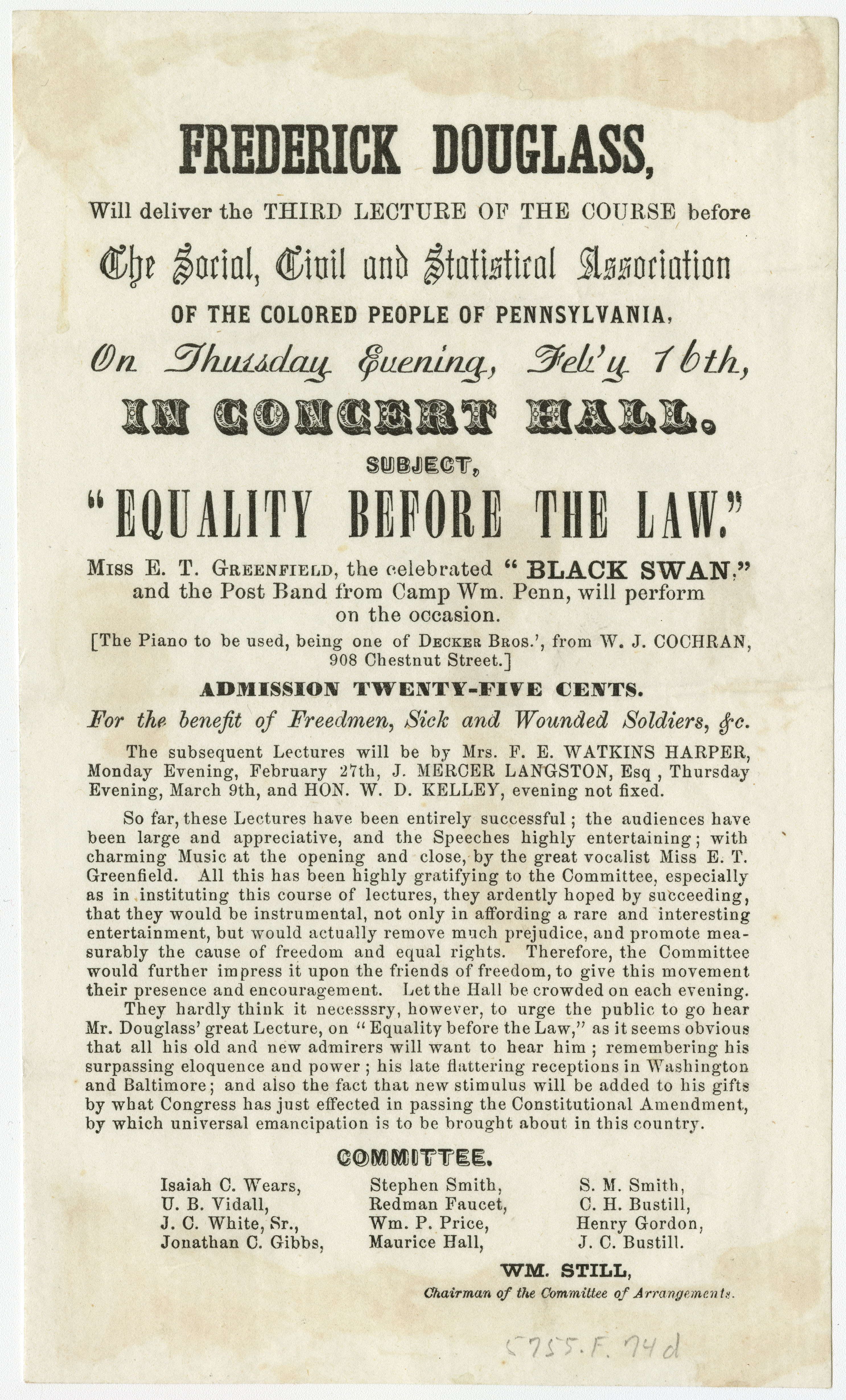
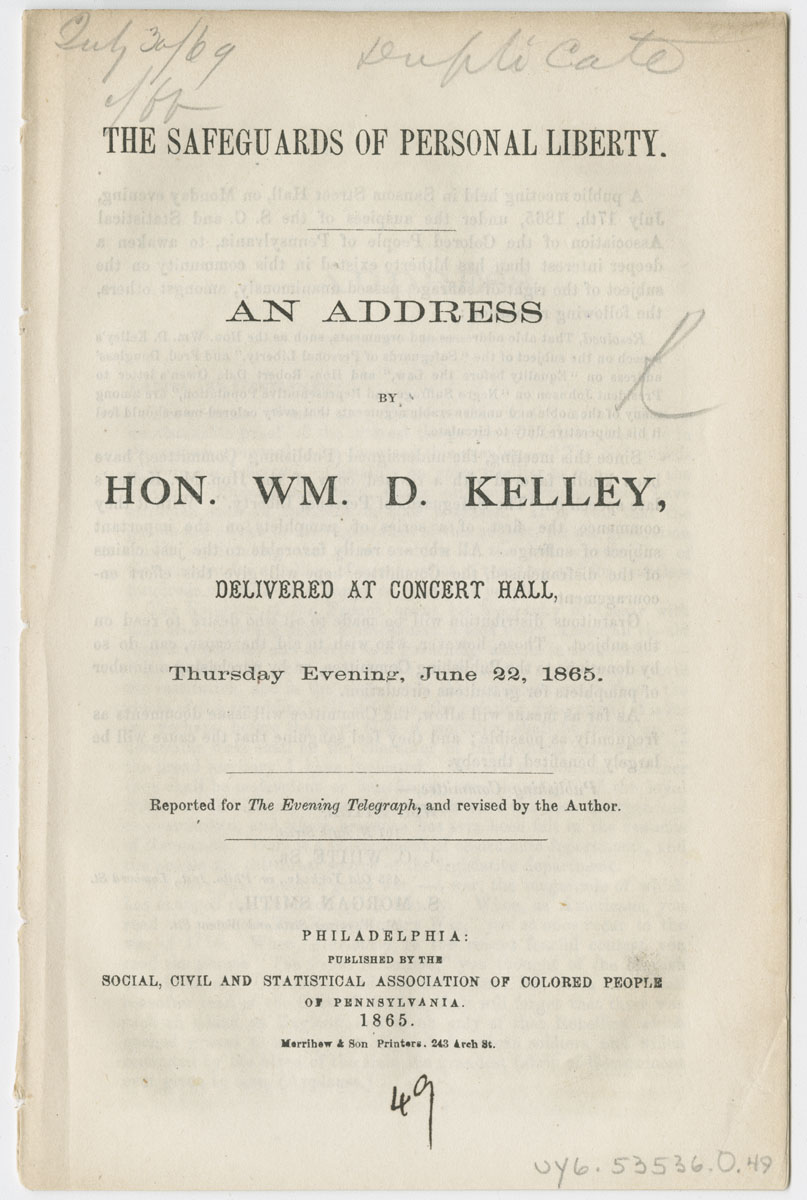
Frederick Douglass, Will Evangelize the Tertiary Lecture of the Course earlier the Social, Civil and Statistical Association of the Colored People of Pennsylvania . Philadelphia, 1865.
William D. Kelley. The Safeguards of Personal Liberty. Philadelphia: Social, Civil and Statistical Clan of the Colored People of Pennsylvania, 1865.
William Withal founded the Social, Civil and Statistical Association in 1860 to gainsay prejudice and to promote racial equality. In order to entice audiences, the association oftentimes held events which combined serious lectures with popular entertainment. In add-on to leading the campaign to desegregate Philadelphia streetcars during the 1860s, the association organized lectures to encourage support of the new constitutional amendments, such as this speech communication by Congressman William D. Kelley on the need for blackness male suffrage.
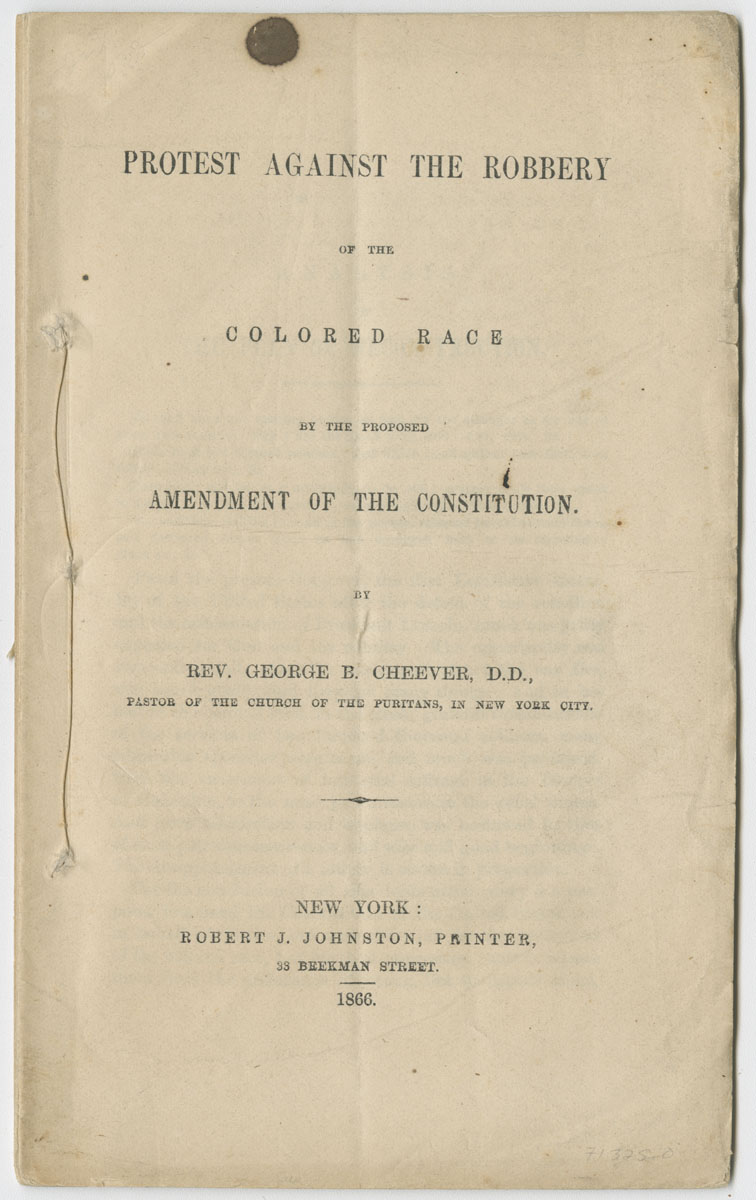
George Cheever. Protest confronting the Robbery of the Colored Race past the Proposed Subpoena of the Constitution. New York: Robert J. Johnston, 1866.
The Rev. George Cheever (1807-1890), a Presbyterian clergyman and fervent abolitionist, was 1 of many Northern civil rights activists who opposed the proposed Fourteenth Amendment since it granted citizenship without suffrage. Cheever felt that many Northern supporters of the amendment were pandering to onetime slave holders by encouraging the passage of a watered-down subpoena in exchange for their rejoining the Union.
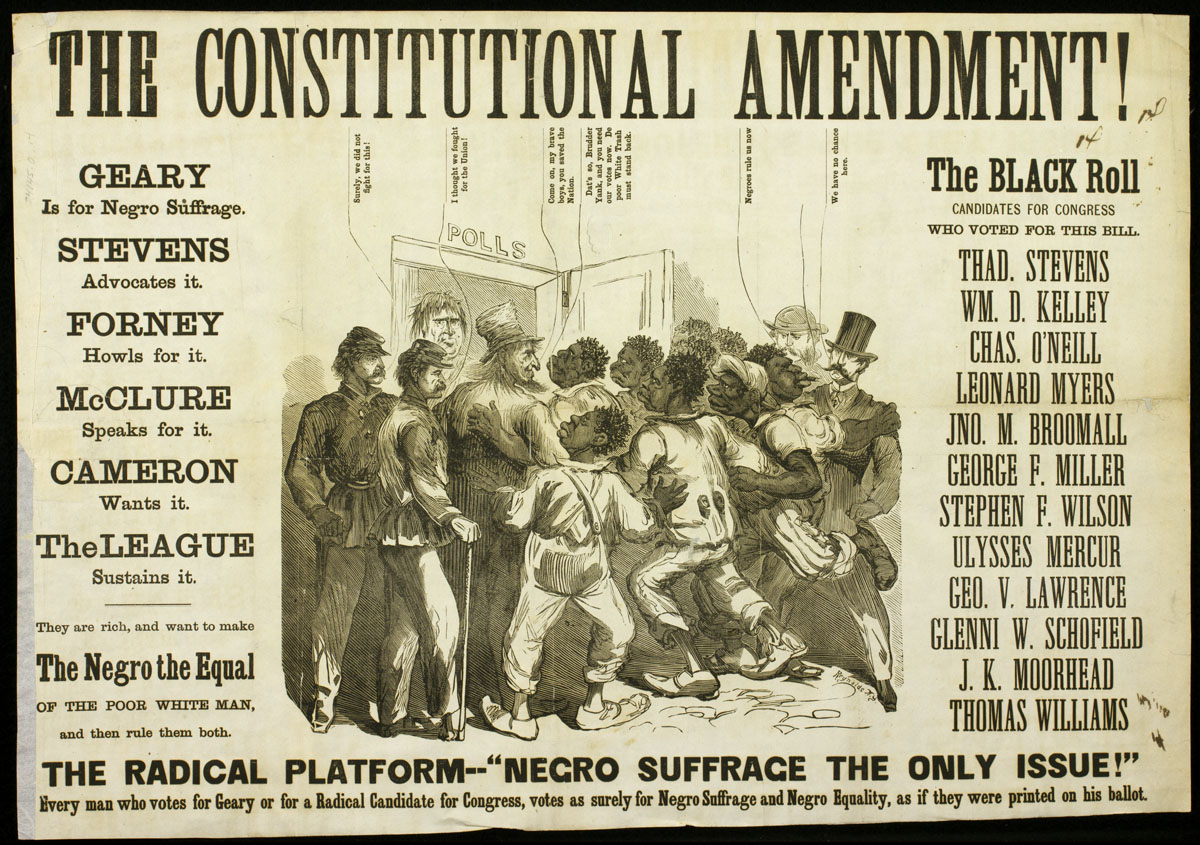
The Ramble Amendment! Geary is for Negro Suffrage. Philadelphia, 1866.
Since the Fourteenth Amendment failed to address voting rights, the consequence of black male person suffrage remained a lightning rod in Northern political campaigns. Radical Republicans, a faction within the Republican Party, unrelentingly supported suffrage and other civil rights for African Americans on moral grounds. Anti-Republican campaign propaganda such every bit this broadside fanned fears about the political party's platform. In this depiction, working-class Irish immigrants and African Americans comprise an unruly crowd which is supposedly unfit for citizenship.
Pennsylvania gubernatorial candidate John W. Geary (1819-1873) championed extending the franchise to black men, who were overwhelmingly supporters of the Republican Party. Similar many other moderate, white Republicans, Geary favored African American suffrage in society to insure that the political party remained in power rather than out of concern for blackness rights.
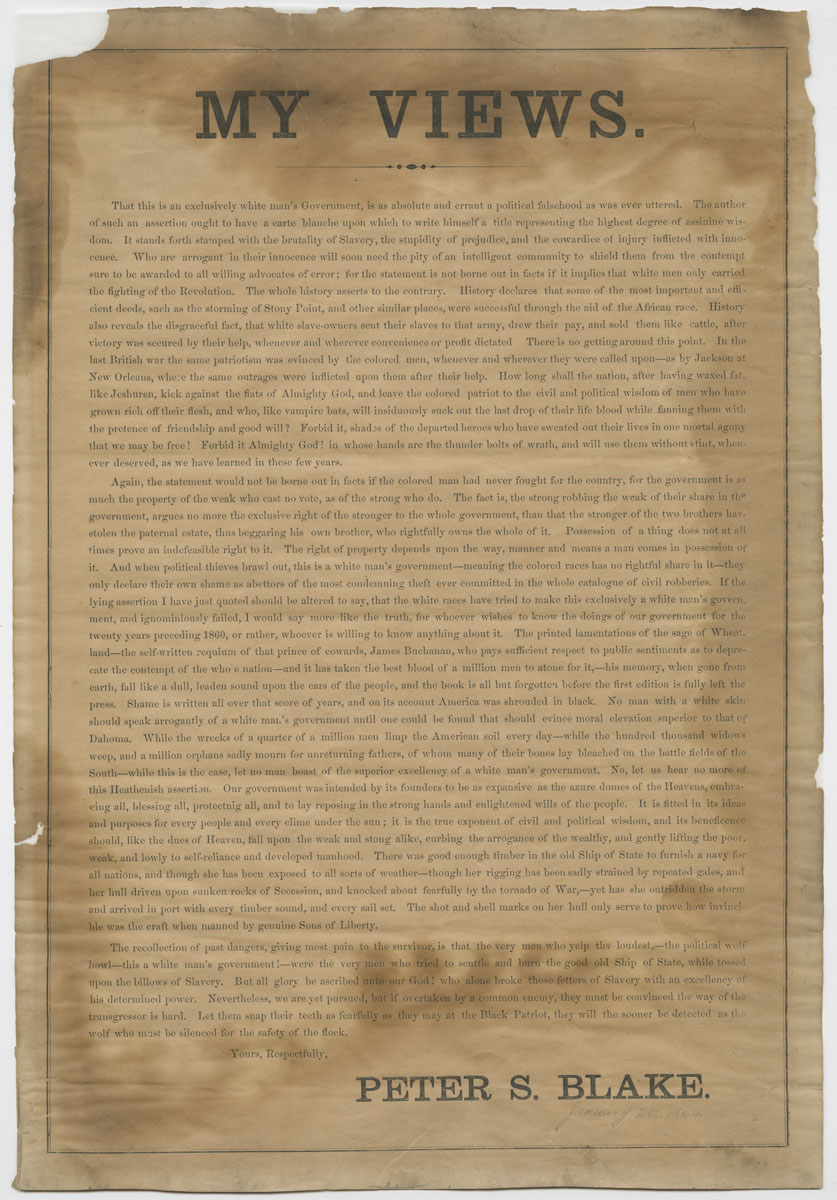
Peter S. Blake. My Views. 1866.
Peter South. Blake argued for African American equality in this broadside equally well every bit in letters to the editor of The Christian Recorder. He likely wrote in protest of Democratic attempts in Congress and land legislatures to prevent blackness male suffrage. A Civil War naval veteran who was born gratuitous in Wilmington, Delaware, Blake stressed the important part that African Americans had played in helping to forge the nation, particularly during times of state of war.
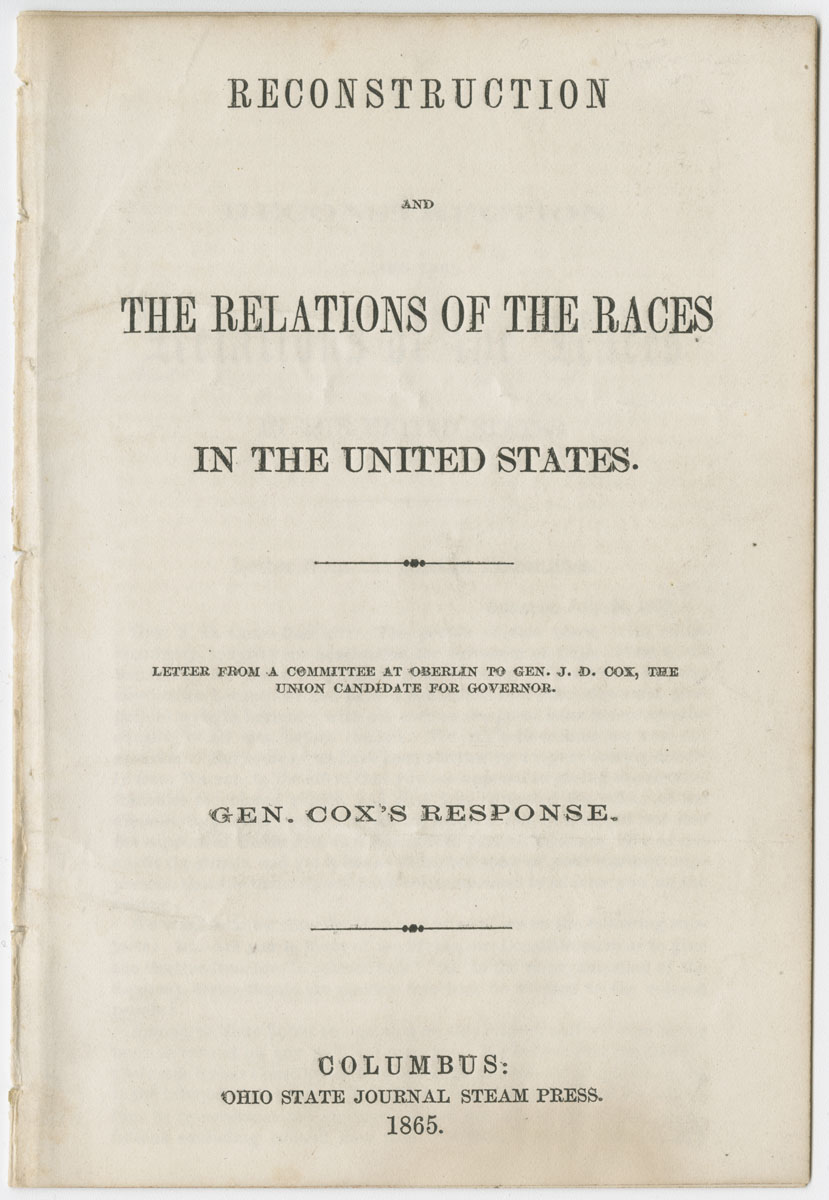
Reconstruction and the Relations of the Races in the Usa: Alphabetic character from a Committee at Oberlin to Gen. J.D. Cox, the Spousal relationship Candidate for Governor . Columbus: Ohio State Journal Steam Press, 1865.
This pamphlet documents the exchange between a self-appointed committee of Ohioans and gubernatorial candidate Jacob D. Cox on his views of Reconstruction. Cox's letter established him as a supporter of President Andrew Johnson'southward anti-blackness suffrage platform, and further suggested that the races should live separately. Cox partly dismissed the committee's concerns for black suffrage since they were not empowered by an incorporated organization such as a political political party. While Cox had enough supporters to win election to one term of function, Ohio Radical Republicans insured that the governor elected in the 1867 elections was more sympathetic to the extension of civil rights to black Ohioans.
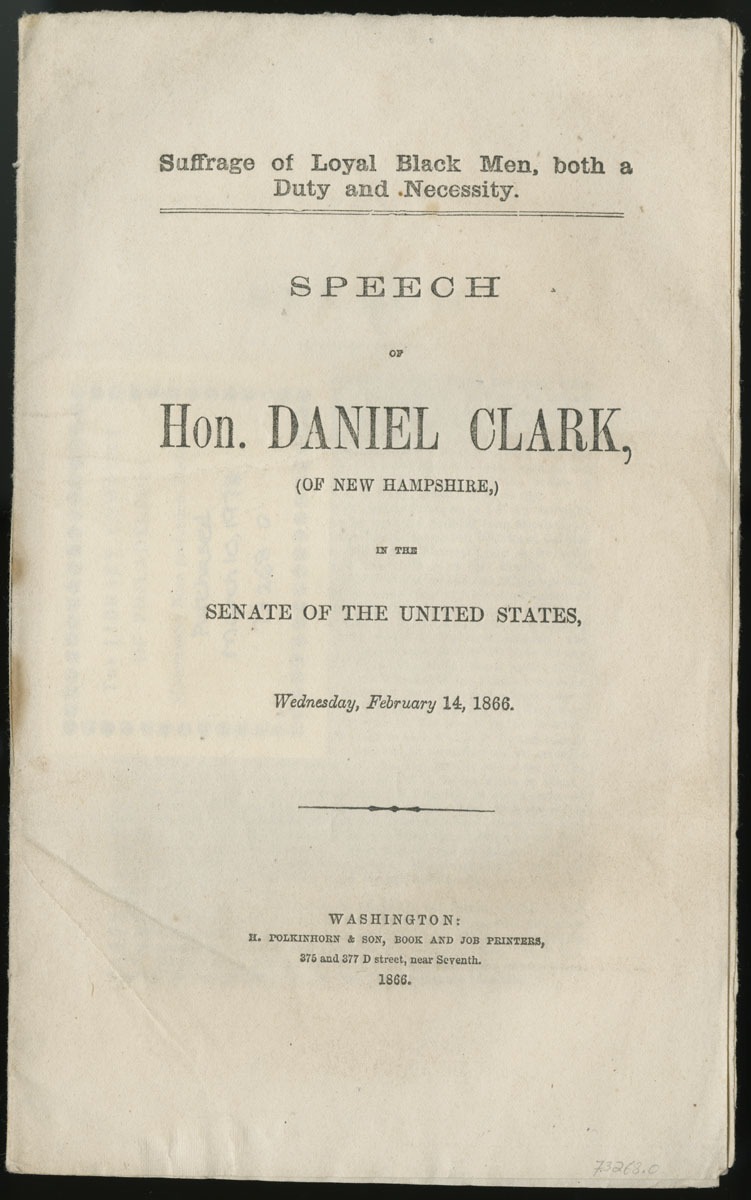
Daniel Clark. Suffrage of Loyal Black Men, Both a Duty and Necessity. Washington: H. Polkinhorn & Son, Volume and Job Printers, 1866.
New Hampshire Congressman Daniel Clark was one of many in the Republican Party who believed that African American men had earned the right to vote through their patriotic military machine service during the Ceremonious State of war. Basing the right to suffrage on military machine service excluded both black and white women.
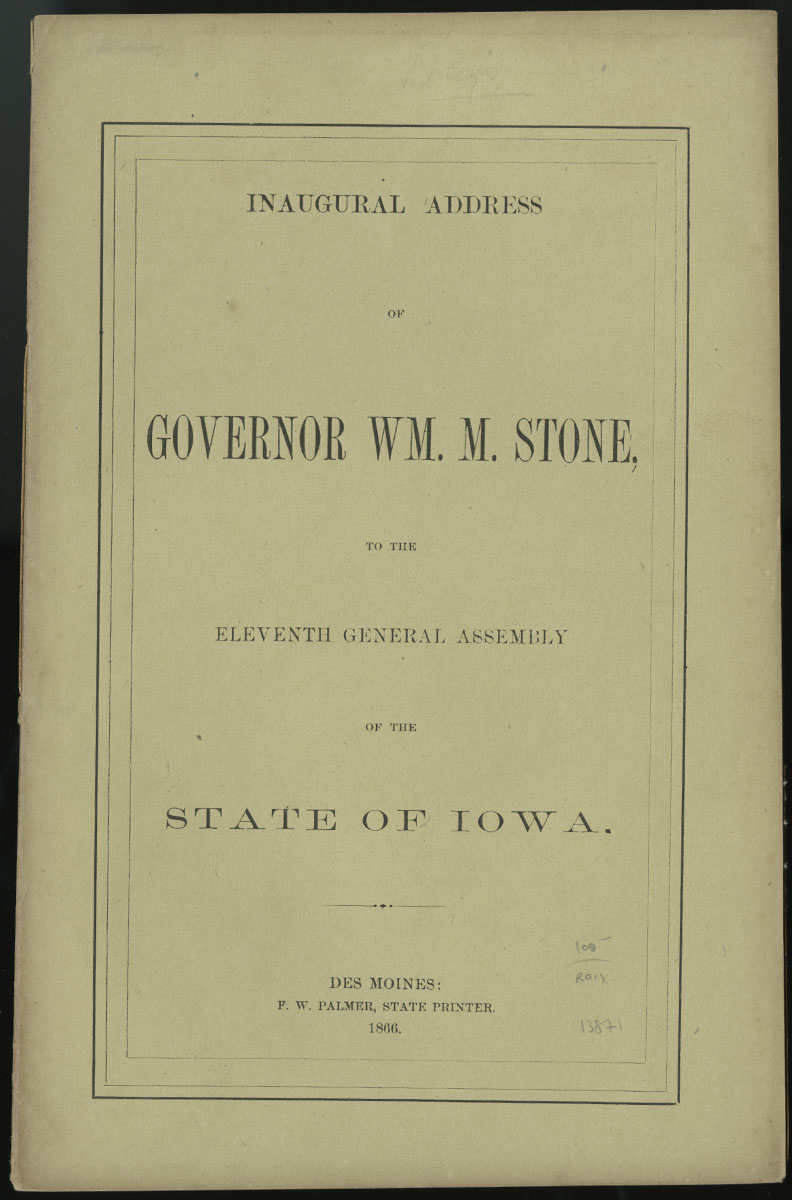
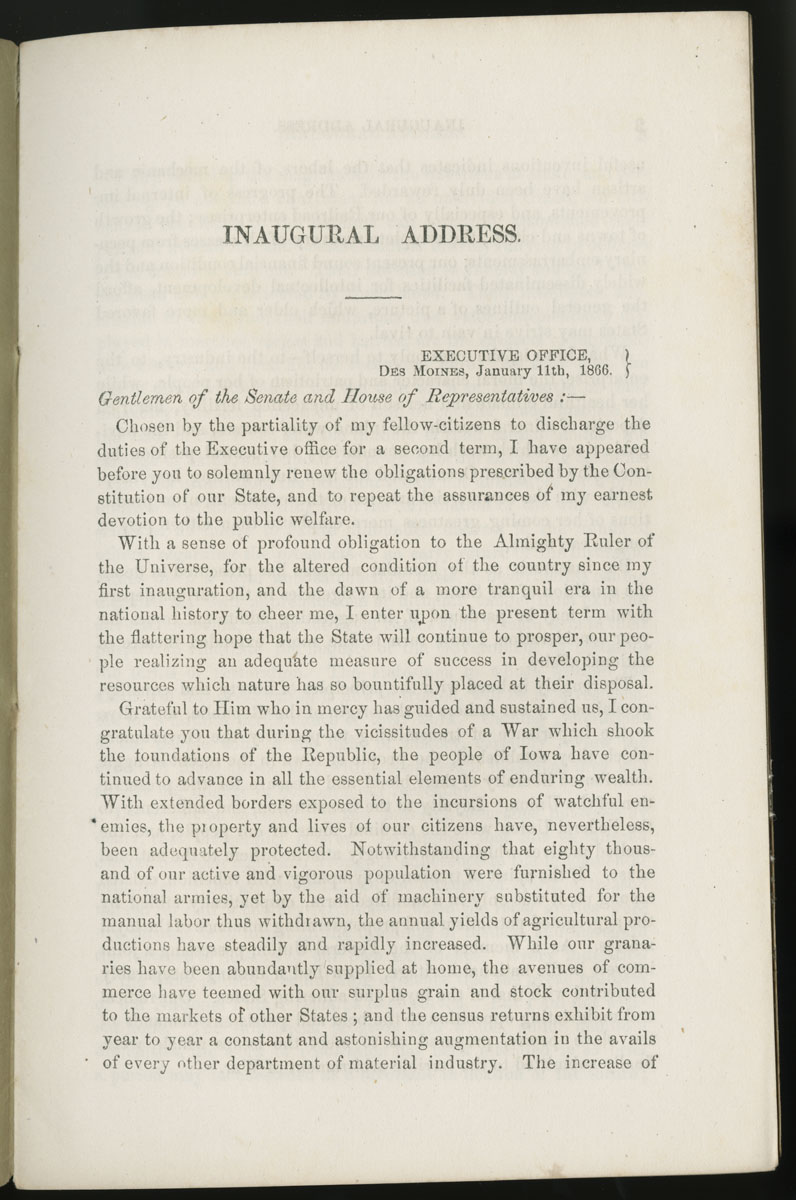
Inaugural Accost of Governor Wm. Thousand. Rock, to the Eleventh General Assembly of the State of Iowa . Des Moines: F. Westward. Palmer, 1866.
William Thou. Stone devoted much of his second inaugural oral communication to Reconstruction and the expansion of civil rights for African Americans. As he entered his second term equally Iowa governor, the U. S., Congress was debating the civil rights legislation that would ultimately lead to the passage of the Fourteenth Amendment. Stone argued that African Americans deserved equality and male suffrage because of their "unwavering allegiance to the Spousal relationship" and backbone on the battlefield. Although Stone praised Iowans for eliminating about of the state's Black Codes from its law books, he urged them to lay aside prejudice toward African Americans. Stone also supported striking the word "white" from the Iowa constitution'south language regarding suffrage rights, an human action that was accomplished in 1868.
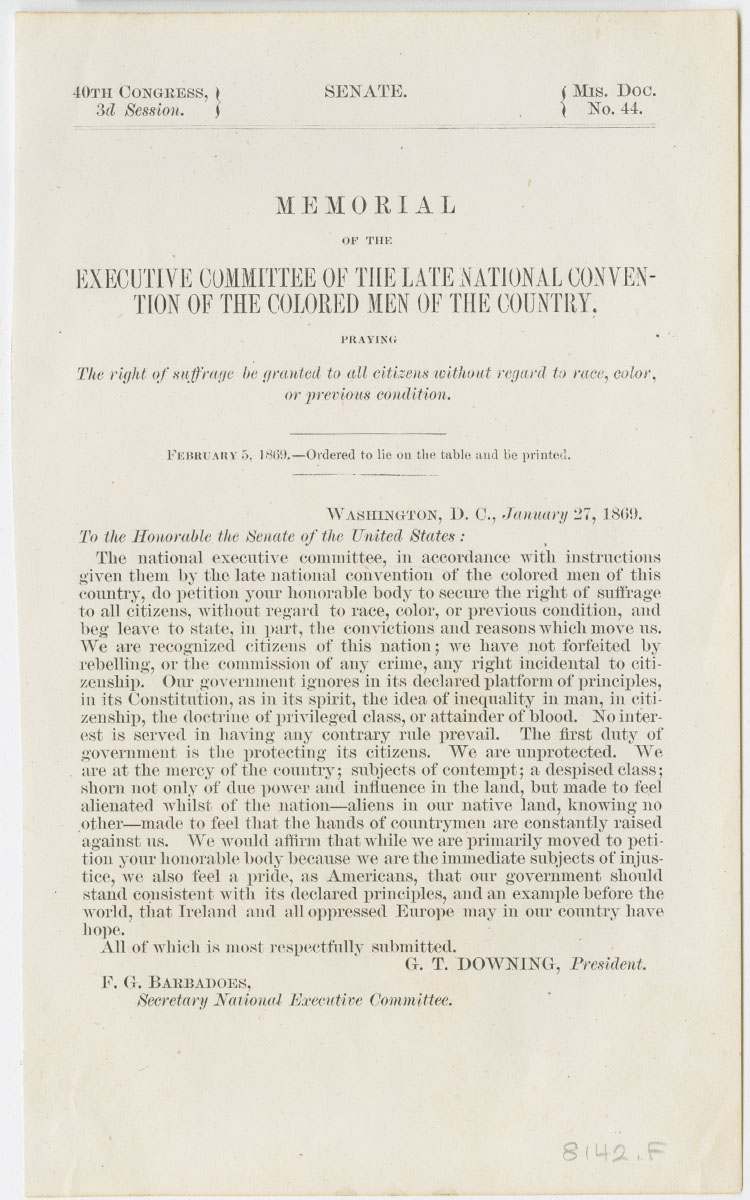
National Convention of the Colored Men of America. Memorial of the Executive Committee. Washington, DC, 1869.
George T. Downing, president of the National Convention of the Colored Men of America, submitted this petition on suffrage to Congress shortly after the convention's 1869 meeting. The petitioners' linguistic communication pointedly emphasized their status as citizens, established by the Fourteenth Amendment in 1866, as justification for the franchise.
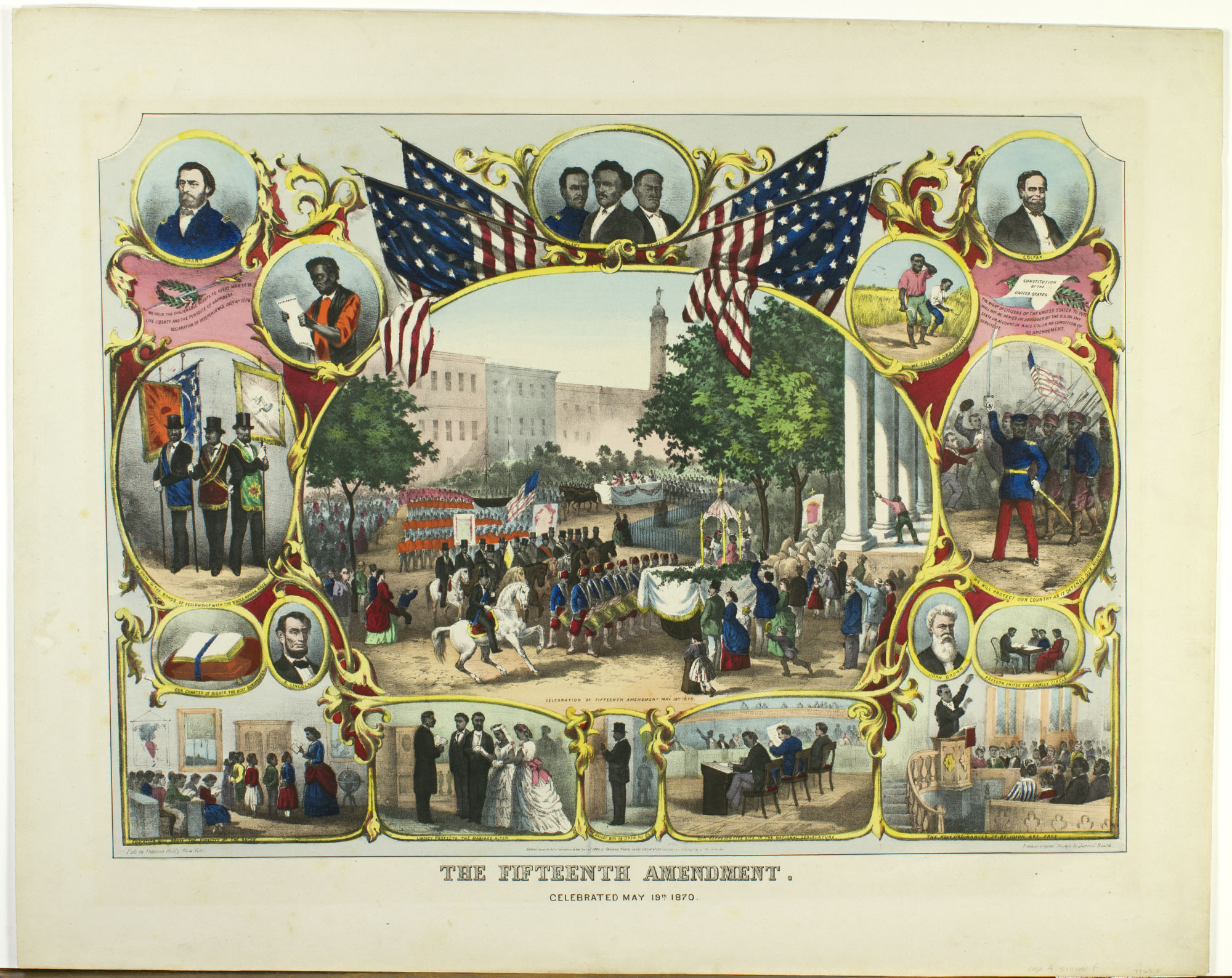
James C. Beard. The Fifteenth Amendment. Celebrated May 19th 1870. New York: Thomas Kelly, 1870.
African American and white civil rights activists held massive celebrations throughout the country on the passage of the Fifteenth Subpoena. Supporters believed that the power of the ballot box would let African Americans to repeal discriminatory laws and to elect officials who would protect them from land and extralegal violence. Pictured here is the Baltimore celebration, reportedly the nation's largest with more than xx,000 participants.
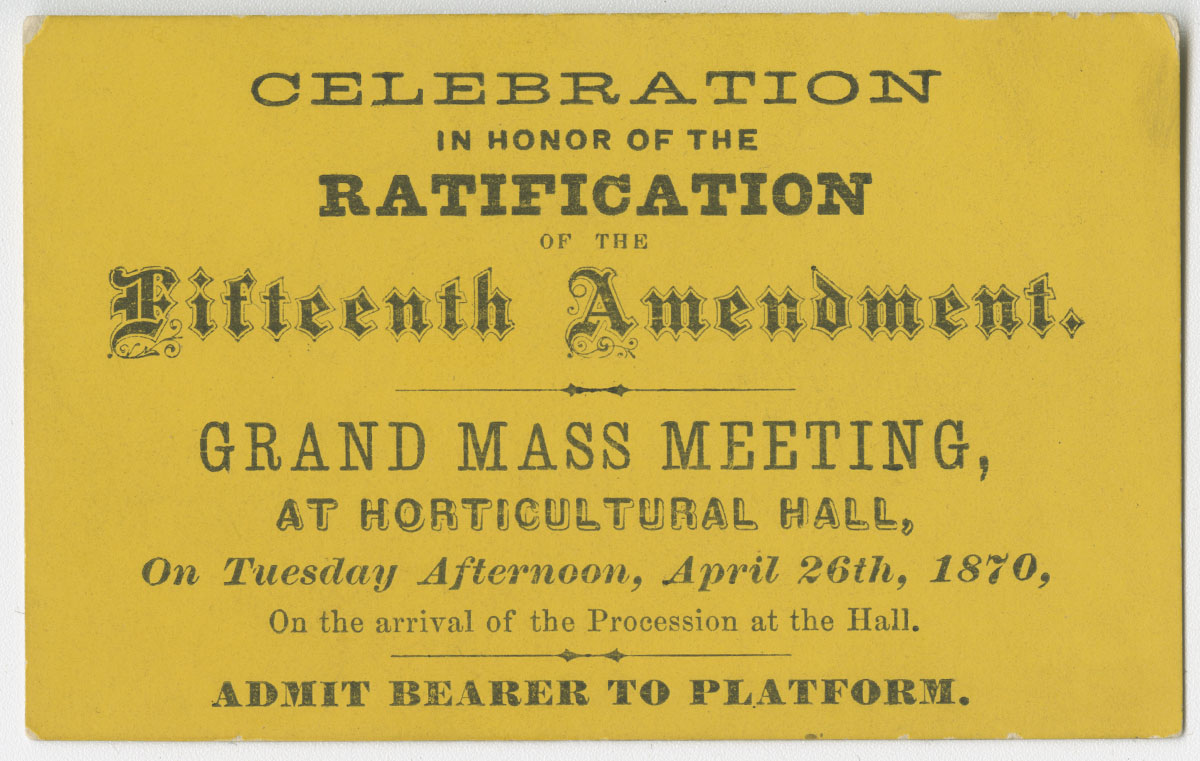
Celebration in Laurels of the Ratification of the Fifteenth Amendment . 1870. Courtesy of the Historical Society of Pennsylvania.
The Fifteenth Amendment celebration in Philadelphia lasted for more than five hours. Festivities included marching bands, speeches, and a parade. Included in the procession was a wagon that held a printing press which reproduced copies of the amendment for distribution.
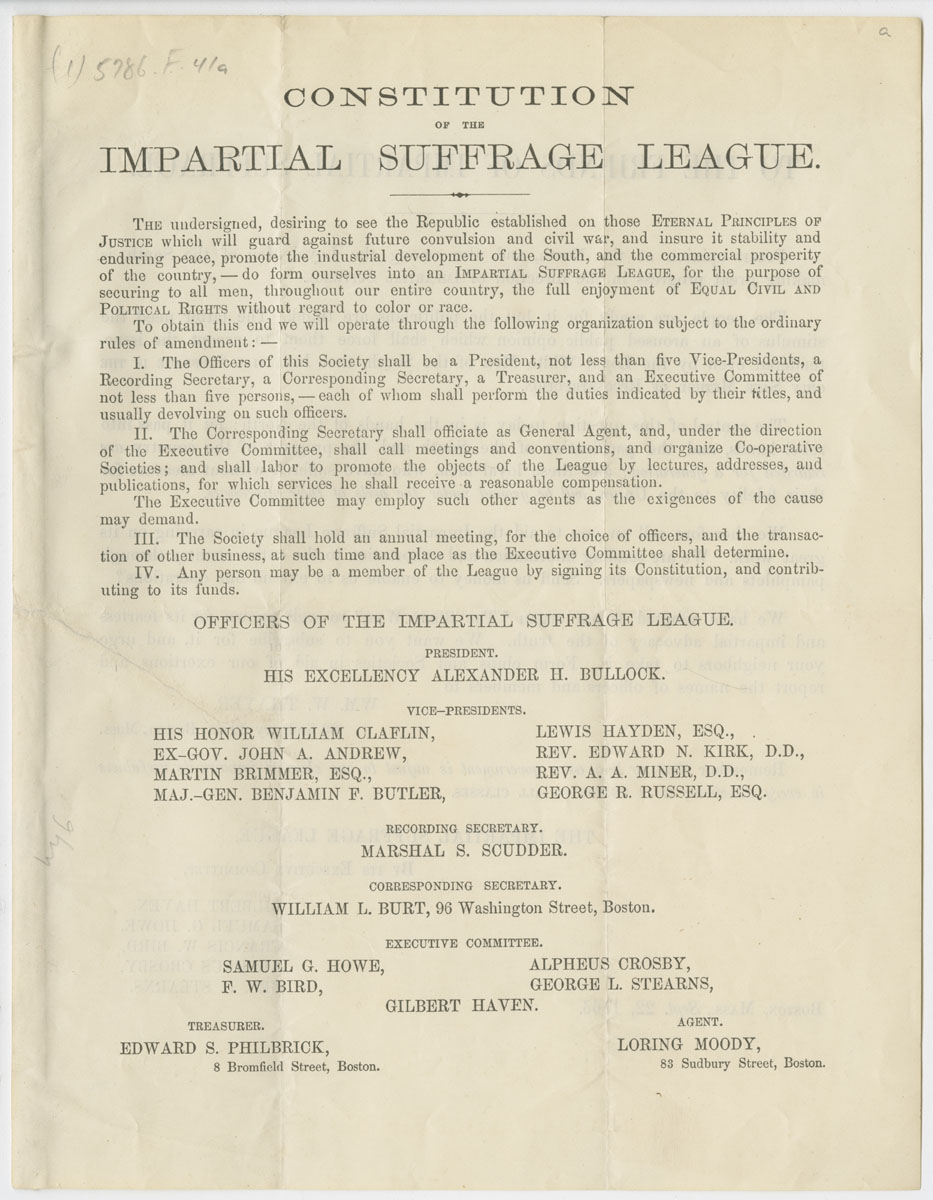
Constitution of the Impartial Suffrage League. Boston, 1866.
The Impartial Suffrage League was founded in Boston in 1866 past male abolitionists and businessmen, including Samuel Gridley Howe and Benjamin Butler. Notably absent was abolitionist and Bostonian William Lloyd Garrison, whose championing of black civil rights ended with the abolitionism of slavery. League members expressed support for women's suffrage, just the league's constitution was confined to attaining black male person suffrage, and its leadership consisted only of men.
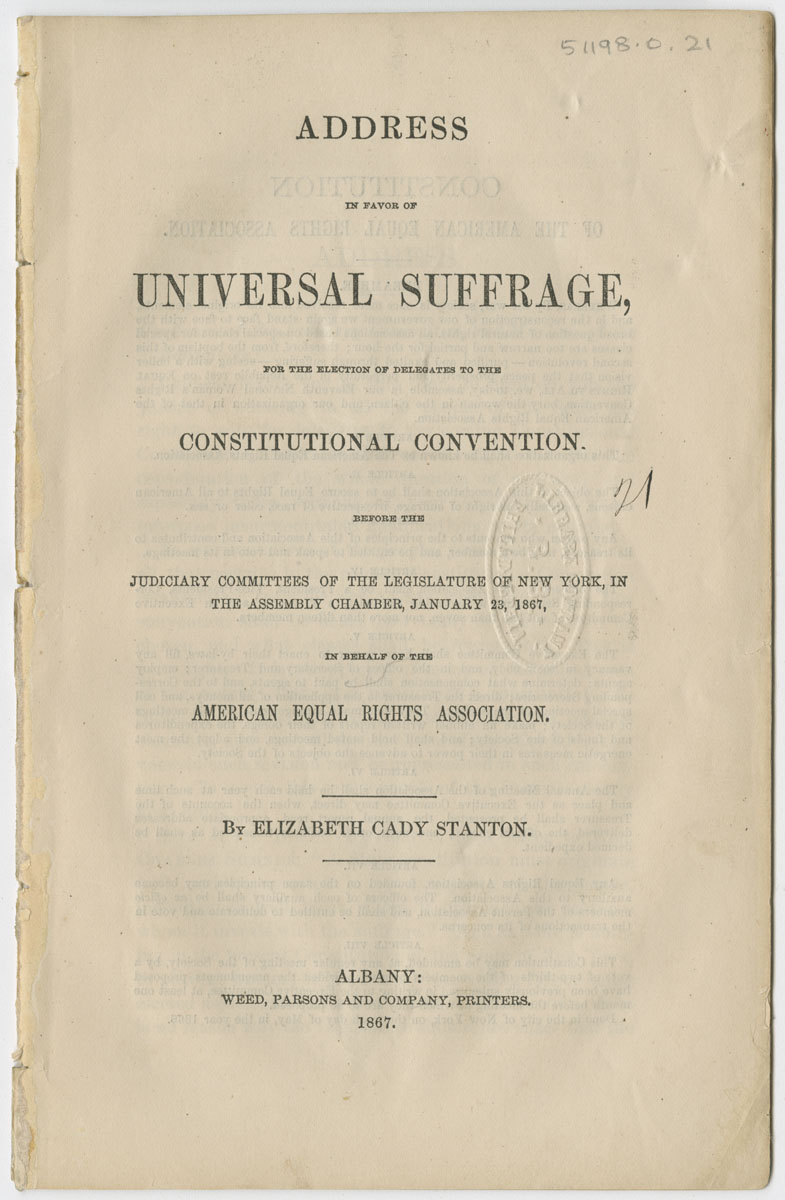
Elizabeth Cady Stanton. Address in Favor of Universal Suffrage. Albany: Weed, Parsons and Company, 1867.
Suffragist Elizabeth Cady Stanton initially supported voting rights for black men, as she expressed in this address. Still, Stanton objected to giving uneducated one-time slaves the vote earlier white women. By the 1868 American Equal Rights Association Convention, Stanton refused to endorse the Fifteenth Amendment unless it covered women also.
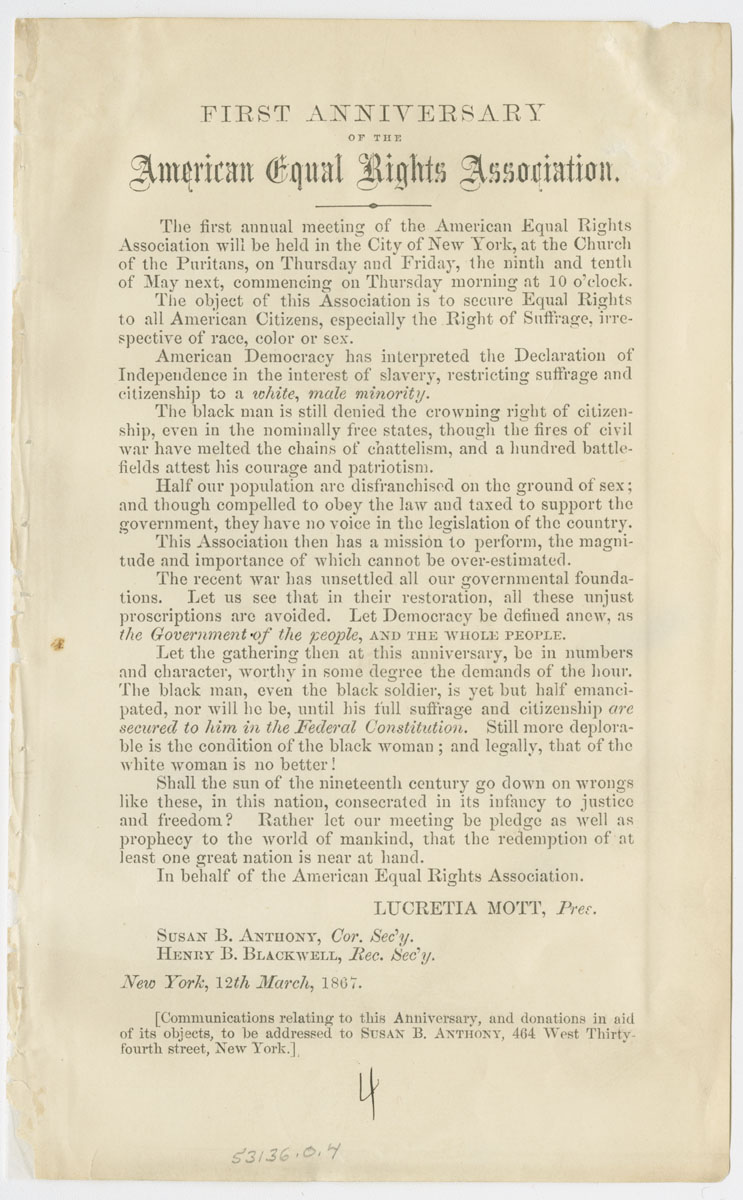
Start Anniversary of the American Equal Rights Association . New York, 1867.
The American Equal Rights Association was founded in 1866 past an interracial group of men and women in guild to campaign for black men's and women's suffrage. Several Northern black women, including Harriet Forten Purvis, Sojourner Truth, and Frances Ellen Watkins Harper, were amid the founders. While Frederick Douglass and George T. Downing supported the cause of women's suffrage, the issue divided the black customs. Some blackness men, including Robert and Harriet Purvis's two sons, believed that politics was a male domain and that conventional gender roles reinforced the race's progress towards being civilized Americans.
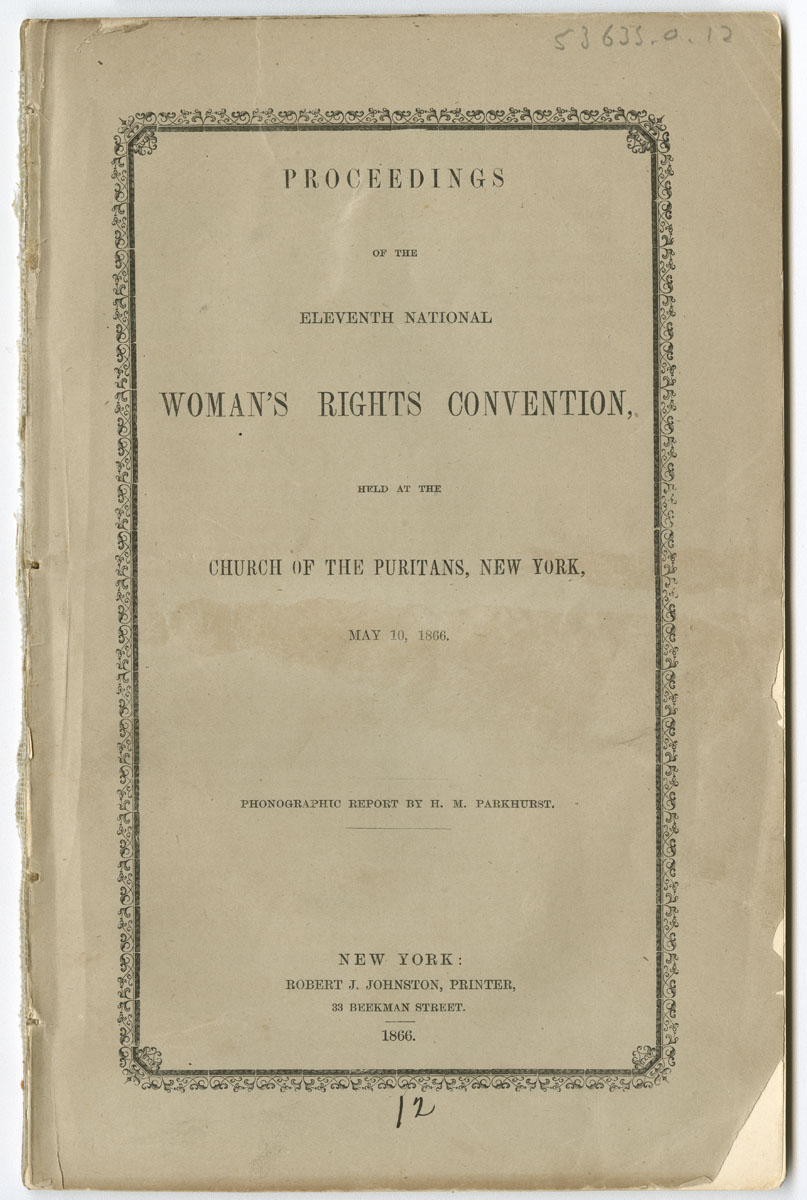
Proceedings of the Eleventh National Woman'due south Rights Convention . New York: Robert J. Johnston, 1866.
The 19th-century women'due south rights motility grew out of the activism of women abolitionists, who learned how to fundraise, organize, and market political protestation. Abolitionist Frances Ellen Watkins Harper was also a supporter of the movement and spoke at several women'southward rights conventions, including this i in New York Urban center. Noting the double discrimination faced by black women, Harper urged the convention not to carelessness its support of rights for African Americans. Harper's pleas were ultimately in vain as, in 1869, leaders of the women's rights movement centrolineal themselves with Southern segregationists in pursuit of white women's suffrage.
Source: https://librarycompany.org/geniusoffreedom/northern-blacks-and-the-reconstruction-amendments/
Posted by: jacksonsains1958.blogspot.com






0 Response to "In What Ways And To What Extent Did The Fourteenth And Fifteenth Amendments Change The Relationship"
Post a Comment